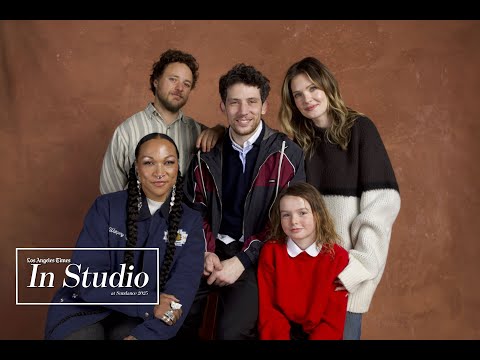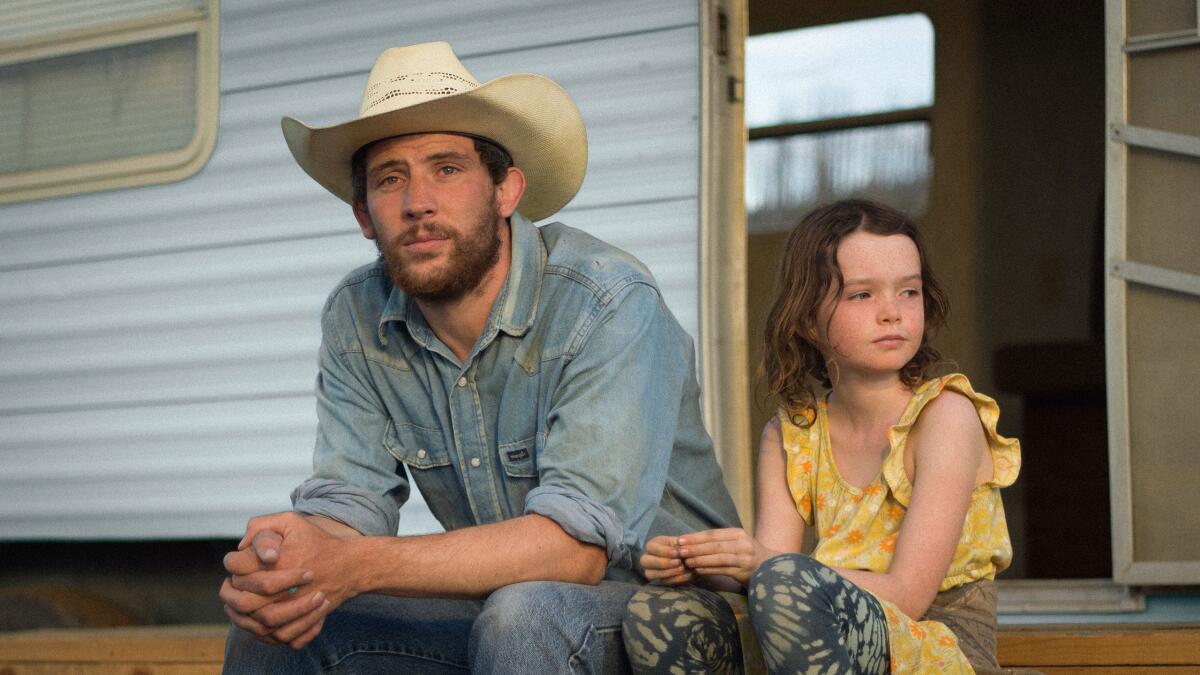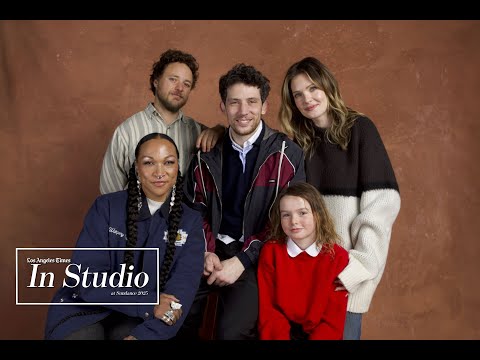PARK CITY, Utah — For those of us fortunate enough to avoid evacuation, much less life-altering destruction, during the recent L.A. wildfires, the past weeks have come with a certain numbness. What level of grief is appropriate, after all, if you are experiencing it secondhand?
“Rebuilding,” from writer-director Max Walker-Silverman, provided the outlet I needed. Starring Josh O’Connor as Dusty, a rancher trying to pick up the pieces after a wildfire destroys his home, the film culminates in a moment of sorrow — and resilience — that finally brought me to tears: “You got what you got,” as one character puts it, “and it was always enough for me.”
The film, which deals with derelict FEMA trailers, bureaucratic red tape and the impossible choice between starting over or moving on, was inspired by Walker-Silverman’s own family tragedy: A wildfire destroyed his grandmother’s Colorado home, taking her beloved recipes with it and leaving her once-verdant land a blackened burn scar. Co-starring Lily LaTorre as Dusty’s daughter, Callie-Rose; Meghann Fahy as his ex, Ruby, and Kali Reis as Mila, a woman who’s lost not only her home but her husband in the fire, “Rebuilding,” with uncanny timing, relates a tale that will be told many times over the coming years in Southern California and other disaster zones.
Ahead of the film’s premiere, Walker-Silverman and the film’s cast visited The Times’ studio at the 2025 Sundance Film Festival. The conversation has been edited and condensed.

Max, I want to start with you, since your family’s experience of a wildfire inspired the film. How is your family doing now? What part of the rebuilding process are you all in?
Max Walker-Silveman: This story comes about from a very basic human thing, which is loving one’s home and feeling good there, and then being forced to reconcile with that home being fragile and occasionally being taken from us. And strangely, even in the face of that loss, a feeling of home remaining and, in a very surprising way, being deepened. It’s an experience that I’m familiar with and that many people are familiar with. And it’s very surprising. This movie I created [is] about not disaster, ultimately, not loss, but about the amazing things that happened afterwards, which is, time and time again, people taking care of each other and communities coming together and people being friends and neighbors in ways they never would have otherwise. And I wrote this, I think, because disaster is going to be part of our lives forever. It’s not something that will really begin or end. And if that’s the case, hopefully the communities that come together afterwards can continue to be part of our lives as well.
For the rest of you, I’m wondering if in making this film anything about the rebuilding process struck you or surprised you or maybe dismayed you about how that plays out in our country right now for people?
Josh O’Connor: As Max articulates powerfully, these disasters are becoming more frequent and affect everyone, directly or indirectly, more frequently now. So I was really interested in Max’s focus on the human side of how we respond. And community is the solution in these matters. And I think right now, as you alluded to, we’re all very aware of what’s going on in L.A. and all over the world. And our job is to look at the human impact of these things.
Dusty starts off being very concerned with the idea of “building back just the way it was.” And what we watch him do is sort of understand how change and adaptability might actually allow for more of that hope than exactly putting things the way that they were. What were the conversations like between you and Max that sort of helped you understand the mindset that Dusty has and how it changes over the course of the film?
O’Connor: One of the early chats we had, and something we went and explored a bit and it’s actually in the movie, is the surprising and magical moment when green comes back to the landscape. Dusty’s image of rebuilding as it was, you know, replicating what they had, it’s in a way tied in to grief. And there’s something really exceptional about accepting something different that doesn’t necessarily have to be worse or better, but is new. That’s what I really liked about this moment of the green coming through — that landscape, irrespective of him trying to get the loan or trying to build back what he had, it will never be the same. And that can be a beautiful thing.
It’s interesting that you bring up grief because what I experienced watching the film, Meghann, is when your character reads [a] letter [from her late mother], it was like the emotions that I had about the fire came out. I’m wondering if you could talk about what the atmosphere was like on set that day.
Meghann Fahy: The vibe on set, as it was every day, was sort of gentle and loving and very peaceful. And it’s a very intimate moment. We’re all just sort of seated at this table. And I think I sort of felt the support energetically just by being at that round table with those people.
Walker-Silverman: That scene that you did there, Meghann, is like really one of the most amazing performances I’ve ever seen. I remember exactly where I was. I was curled up on that little staircase in the house with my monitor and I couldn’t see properly. And realized I was just crying. And then the take ended and everyone on set was crying.
Fahy: But that’s the thing about grief, is that it can feel so lonely when you’re in it. But that’s such a perfect example of every single person on that set, I’m sure everyone’s life has been touched by grief. So it’s just such a beautiful representation, that moment in the film, of another deeply human experience. And it is a connective tissue, whether or not we’re always aware of it or not.

Josh O’Connor and Lily LaTorre in “Rebuilding.”
(Jesse Hope / Sundance Institute)
Kali, your character asks about staying in Colorado, “How long until it burns again?” I’m wondering how you kind of understood her fear of the fires coming back and causing destruction again, and then how she arrives at a kind of place of saying, “You know what, I do want to rebuild here instead of elsewhere.”
Reis: She says as much as she hates it here, she loves it here. And I think that’s her final connection to the loss, not only of her home, but her husband. And I think her real connection, she’ll always be there, because that’s where she lost them. So I know as much as she wanted to run away from the place that may burn again, that’s the connecting piece that she has — and this community that she built around this tragedy, this real human experience. You know, these natural disasters, they don’t have any prejudice. Everybody kind of came together in this community. So I think her final decision was, “If I have to go through it again, what better place to go through it again? What better people?”
One last question for the whole group. At one point, Dusty says, “It’s funny, the things you pack and the things you leave.” I wonder if the experience of making this film made any of you think of a particular heirloom or important item in your life, in your home, that you now would be like, “That’s on my list to make sure that I save.”
LaTorre: I only found out about it a few days ago, but my great-grandmother, she wrote a book — I think it was either about her life or about the university she went to. And it’s a really old book and we’ve got it at our house and watching the movie, it kind of made me think, “Well, this is my great grandmother’s. I wouldn’t want to just leave it there.” I would try my absolute hardest probably to save that antique to have the memory of my great grandmother.
Fahy: That’s a great one.
Walker-Silverman: My mom lost her mom’s recipes in the fire, handwritten recipes. So I think I have some recipes from my mom that I would treasure very much.
O’Connor: My grandmother’s ceramics would be like, I’d have an exit strategy.
Reis: I would definitely take my late brother’s necklace that he has. There’s five of us, and I would take his necklace with me for sure.
Fahy: I have a piece of jewelry from my grandmother that I think would be something I would want to keep.
